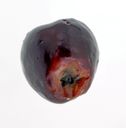Spotted-winged Drosophila
Drosophila suzukii
Classification
- Phylum: Arthropoda
- Subphylum: Hexapoda
- Class: Insecta
- Order: Diptera
- Superfamily: Ephydroidea
- Family: Drosophilidae
- Subfamily: Drosophilinae
- Genus: Drosophila
- Species: suzukii
Pronunciation
How to pronounce Drosophila suzukii: //drəˈsɒfɪlə suːˈzuːki.aɪ//
These audio files are automatically generated. While they are not always 100% accurate, they are a good starting point.
Images






Summary
Drosophila suzukii, known as the spotted wing drosophila, is a notable agricultural pest that infests healthy fruits early during ripening, posing economic threats to soft-skinned fruit crops. Originally from East Asia, it has become widespread in North America and Europe after its discovery in California in 2008. The species is identifiable by the male's distinct wing spots and is known for its rapid reproduction and potential for significant economic impact.
Physical Characteristics
Red eyes, yellowish-brown body color with dark bands on the abdomen. Males have a small dark spot on the leading edge of the wing near the tip, referred to as 'spotted wings'. Females lack the spot and possess a larger ovipositor than other common Drosophila spp.
Identification Tips
Males have a distinctive dark spot on the wings, while females do not. Look for the serrated ovipositor in females during identification.
Habitat
Prefers habitats with a variety of soft-skinned fruits, including orchards, vineyards, and gardens.
Distribution
Native to east and southeast Asia; established across the Pacific Coast of North America (BC-CA) and Florida since 2008, and has spread to various states in the US and Europe.
Diet
Feeds on healthy fruits, laying eggs underneath the skin where larvae develop.
Life Cycle
Life cycle can be as short as 8-9 days, with potential for up to 13 generations per year in warmer climates.
Reproduction
Females lay 1 to 3 eggs per fruit, with a potential total of 300 eggs during their lifespan.
Predators
Earwigs, damsel bugs, spiders, ants, Orius (minute pirate bugs), ground beetles, crickets, green lacewings, rove beetles, birds, and mammals.
Ecosystem Role
As a pest, it plays a significant role in agricultural ecosystems, impacting fruit production.
Economic Impact
Causes serious economic loss to fruit crops in North America and Europe, with identified losses exceeding $500 million in the U.S.
Collecting Methods
- Sticky traps using apple cider vinegar and baits
Preservation Methods
- Freezing
- Ethanol preservation
Evolution
D. suzukii has slower evolution rates due to its number of generations and diapause during winter months.
Misconceptions
Often confused with other fruit flies, particularly the western cherry fruit fly due to similarities in appearance.
Tags
- Spotted Wing Drosophila
- Fruit Fly
- Agricultural Pest
- Drosophilidae
- Drosophila suzukii
- Invasive Species